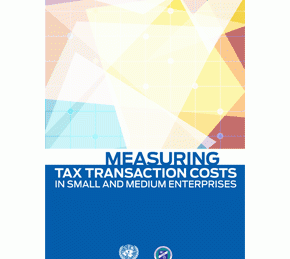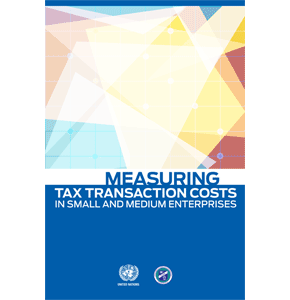Measuring Tax Transaction Costs in Small and Medium Enterprises
Measuring Tax Transaction Costs in Small and Medium Enterprises is a result of a project, implemented jointly by the Financing for Development Office (FfDO) and the Inter-American Center of Tax Administrations (CIAT), aimed at strengthening the capacity of national tax administrations (NTAs) in developing countries in Latin America to assess tax transaction costs (TTCs). The purpose of this publication is to provide NTAs with a methodology that allows them to identify and measure TTCs for taxpayers and tax institutions, thereby assisting in identifying possible reforms aimed at reducing these costs with a view to fostering greater tax compliance. It is available in English and Spanish.
This publication is a result of a Development Account project, undertaken jointly by the Financing for Development Office (FfDO) and the Inter-American Center of Tax Administrations, aimed at strengthening the capacity of national tax administrations (NTAs) in developing countries in Latin America to measure tax transaction costs (TTCs). The ultimate goal of this project was to support the development of an empirical methodology to assess TTCs, which could assist in identifying possible reforms aimed at reducing these costs with a view to fostering greater tax compliance. This could lead to more effective and efficient tax systems supporting the desired level of investment, and result in sustainable increase in government revenues available to fund countries’ development goals.
Implementation of the project started in May 2012. As a first step, FfDO and CIAT held several working meetings to discuss its conceptual framework and scope. Subsequently, three regional consultants, namely: Mr. Byron Vásconez (Leader), Mr. Eduardo Ibarra and Mr. Marcel Ramírez La Torre devised a concept paper aimed at outlining the process and modalities for developing a methodology to measure TTCs in small and medium enterprises.
On this basis, a first draft of the methodology was prepared and thoroughly discussed at a workshop, which was held in Panama City, Republic of Panama, from 27 February to 1 March 2013, with the participation of 14 officials from the NTAs of 10 Latin American countries.
Following the workshop, the methodology was revised to take into account the feedback and comments provided by the participants, and then it was pilot tested in Costa Rica and Uruguay, with the support of local teams of officials from the respective NTAs. At the same time, the Brazilian NTA engaged with the project and pilot tested the methodology in its own system on a self-funded basis.
The results of the pilot implementation of the methodology in the above-mentioned countries were then presented and discussed at a workshop, which was held in Panama City, Republic of Panama, from 20 to 21 November 2013, with the participation of 16 officials from the NTAs of 13 Latin American countries.
A comprehensive description of the methodology, detailed reports of its pilot implementation in Costa Rica and Uruguay, as well as a summary of the lessons learned and relevant recommendations are included in this publication. It is important to note that these recommendations are based on several approaches that have proven to be good practices in various countries. However, tax administrators should be cautious in applying them to different contexts and should consider the legal framework and the degree of institutional development required to adapt these practices to any specific country situation.
This publication is available in English and Spanish.


